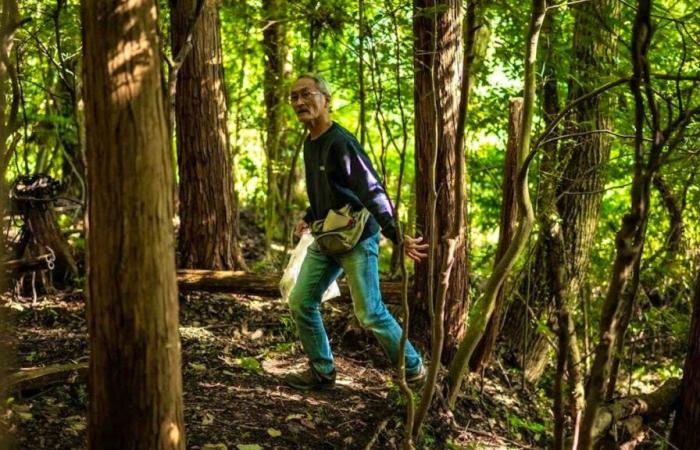For more than half a century, Masana Izawa has followed the same routine when a natural need arises: he locates a suitable little corner in his isolated forest in Japan and drops his pants. “We survive by eating other living things. We can therefore return our excrement to nature so that soil organisms can decompose it,” explains this 74-year-old man.‘AFP. “We give back life. What act could be more sublime?” adds the man who describes himself as “Fundo-shi” (master of excrement).
In his field, he is a sort of authority: he publishes books on the subject, gives lectures on excrement, mushrooms and his philosophy. And people flock to his centuries-old wooden “Poopland” and “Fundo-an” (excrement house) in Sakuragawa, north of Tokyo. There, in its private forest the size of a football field, visitors get a crash course in how to “poop” in the great outdoors.
“I find that the purpose of life is to “noguso” (defecate)”
“Noguso” (defecating in nature in Japanese) requires digging a hole, a few leaves to wipe yourself with, a bottle of water to wash with and some twigs to mark the spot. This marking makes it possible to avoid using the same hole twice and to keep track of the decomposition process. “Touch the backs of these leaves! Do you feel how soft they are? It’s nicer than paper,” he tells his visitors for the day, showing silver poplar leaves the perfect size for the palm of a hand.
A practice banned in Japan
Masana Izawa is a former photographer specializing in nature and particularly mushroom photography. His revelation about excrement came at age 20 when he observed a demonstration against the construction of a sewage treatment plant. “We all produce excrement, they wanted the sewage treatment plant, but for it to be installed out of their sight!” he said, describing the demonstrators as “selfish”. Considering that toilets and wastewater treatment require enormous amounts of water and energy, he preferred to start with “Noguso”.
“Letting the earth do its work is much better for the environment,” he proclaims… even though the practice is banned in Japan. To prove his approach, he digs up old holes which, according to him, demonstrate that human excrement is completely and quickly decomposed, provided it does not contain antibiotic residues. “Fungi degrade and transform organisms like dead animals, excrement and dead leaves into nutrient soil on which a forest grows,” he explains.
Her relationship in danger
Izawa says his steadfast beliefs have cost him dearly, including a trip with his wife to Machu Picchu that was canceled after learning the famous Peruvian tourist site was too crowded for him to defecate in the wild. “I put my marriage in danger just for one ‘noguso’,” he says with a laugh.
He believes that climate change and the growing interest in more natural and sustainable lives can convince other enthusiasts, especially young people. Kazumichi Fujii, 43, a soil scientist at the Japan Forestry Research and Management Organization, agrees. “This is due to the Fukushima disaster, the Greta Thunberg movement… the distrust of previous generations and the desire for alternative lifestyles,” says Kazumichi Fujii.
Taste the soil of “Poopland”
But he warns Masana Izawa that his methods may not be as safe as he thinks, particularly his habit of tasting the soil of “Poopland” to demonstrate the validity of his approach. The city of Edo, or pre-modern Tokyo, used human excrement to fertilize agricultural land, but “around 70% of residents suffered from parasitic infections,” explains the specialist.
“I must be seen as a monster,” laughs Masana Izawa. “But it’s because of the human-centered society. In the entire ecological system, no animal other than humans uses the toilet… Humans are rather absurd in my eyes.” He now greatly hopes that his body will also be decomposed in the forest instead of the usual process in Japan of being cremated. “I find that the purpose of life is to be ‘noguso’,” he proclaims.
Curious to find out who’s in the news The essentials? Join us on the number 1 business network in Luxembourg!
(afp/er)






